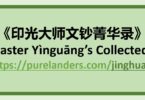
附《楞严经·四种清净明诲》跋
Attached Śūraṅgama Sūtra’s Four Kinds [Of] Clear Instructions [On] Purity’s Postscript
戒定慧三学,为学佛,及修净业者之根本,而戒尤为要。故《观无量寿佛经》,开示净业三福。
[Of] precepts, concentration [and] wisdom, [these] Threefold Learnings, [they] are [the] roots of those learning Buddhism and cultivating pure karma, then [with the] precepts especially as essential. Thus [did the] Sūtra [On] Contemplation [Of] Immeasurable Life Buddha, teach pure karma’s Three Blessings.
一则孝养父母,奉事师长,慈心不杀,修十善业。
[The] first criterion, [is to have] filial support [of] fathers [and] mothers, attend [to] teachers [and] seniors, [with] loving-kindness’ mind not kill, [and] cultivate [the] Ten Good Karmas.
二则受持三归,具足众戒,不犯威仪。
[The] second criterion, [is to] accept [and] uphold [the] Threefold Refuge, [be] complete [with] all precepts, [and] not violate majestic conduct.
三则发菩提心,深信因果,读诵大乘,劝进行者。
[The] third criterion, [is to] give rise [to the] Bodhi Mind, [have] profound faith [in] cause [and] effect, study [and] recite [the] Great Vehicle’s [sūtras, and] encourage progress [of] practitioners.
初二多属戒学,三则三学圆具。具此三福,则净业大成,往生上品。
[The] first two [criteria] mostly belong to Precepts’ Learning, [and with the] third criterion, [are the] Threefold Learnings all complete. Complete [with] these Three Blessings, then [is] pure karma greatly accomplished, [for] rebirth [in a] High Grade.
故于《净土五经》后,附《华严经·净行品》,及《楞严经·四种清净明诲》。以期净业行者,于律仪戒之执身不作,进而得定共戒之制心不起,及道共戒之超情离念,断惑证真。
Thus at [the] Pure Land [Tradition’s] Five Sūtras behind, attaching [the] Flower Adornment Sūtra’s Pure Practices Chapter and [the] Śūraṅgama Sūtra’s [Section On] Four Kinds [Of] Clear Instructions [On] Purity. With hope [for] pure karma’s practitioners, to [be with] Disciplinary [And] Ceremonial Precepts that [are] upheld [by the] body [with] non-doing, progressing then [to] attain Concentration’s Common Precepts that [have] restraint’s mind [with] non-arising, and [the] Path’s Common Precepts that transcend attachments [and] depart [from] thoughts, [to] sever confusions [and] realise [the] true.
[Note 1: With non-doing and non-arising in terms of the precepts is to be so at one with them, that there is no need to have deliberate upholding and restraint. This does not mean to not have upholding of the precepts, or to not have restraint with the precepts; but to naturally be with them.
Note 2: The Disciplinary And Ceremonial Precepts are for beginners to uphold with the body to practise avoiding of evil deeds. This is Precepts’ Learning, the first aspect of the Threefold Learnings.
Note 3: The Concentration’s Common Precepts are for the intermediate to uphold with the mind to practise restraining from evil thoughts (that might give rise to evil words and deeds). This is Concentration’s Learning, the second aspect of the Threefold Learnings.
Note 4: The Path’s Common Precepts are for the advanced to uphold to practise renouncing of attachments and delusions, to realise liberation and wisdom. This is Wisdom’s Learning, the third aspect of the Threefold Learnings. (The above notes show how the Threefold Learnings are all connected to the Precepts.)]
然纵得定共道共二种实益,犹当兢兢业业,执持律仪戒,以为自利利他,维持法道之轨范。则空解脱人,无由以大乘藉口,而因之以坏乱佛法,疑误众生也。
Even if attaining Concentration [and the] Path’s Common [Precepts’] two kinds [of] true benefits, [there] still should [be] cautiousness [and] conscientiousness, [to] firmly uphold [the] Disciplinary [And] Ceremonial Precepts, with [this] for self-benefitting [and] benefitting [of] others, [and for] maintaining standards of [the] Dharma path. Then [are] emptiness ‘liberated’ persons, without reason [to] use [the] Great Vehicle [as an] excuse, and for this ‘reason’ destroy [and] confuse [the] Buddha’s Dharma, [with] doubts [that] mislead sentient beings.
[Note 5: Unless already as highly accomplished Bodhisattvas manifesting otherwise skilfully, the Disciplinary And Ceremonial Precepts should still be mindfully and strictly adhered to. If not, there will be self-harm and harming of others, that destroys expected standards for Dharma practitioners, by becoming bad examples instead. This also prevents deluded ones attached to emptiness, who imagine they have attained liberation, to claim that they are using the Great Vehicle’s skilful means (that only seem to break precepts) to benefit others, when they are just going against the Dharma, corrupting it, and confusing others on how to practise it properly, with the wrong becoming ‘right’, and the right becoming ‘wrong’.]
民国二十五年,岁次丙子,仲春,释印光敬跋。
[In the] People’s Republic [of China’s] 25th year [i.e. 1936 C.E.], [in] Bǐngzǐ year’s second month of spring, [by] Shì Yìnguāng respectfully postscripted.
Namo Amituofo : Translation and notes by Shen Shi’an
相关论解
Related Commentary:
《观经》三福
The Contemplation Sūtra’s Three Blessings
https://purelanders.com/2019/02/04/the-contemplation-sutras-three-blessings
相关经典
Related Sūtras:
中国净土宗十三祖印光大师校订之《净土五经》
‘The Pure Land Tradition’s Five Sūtras’ As Checked By The Chinese Pure Land Tradition’s 13th Patriarch Great Master Yìnguāng
https://purelanders.com/wujing





